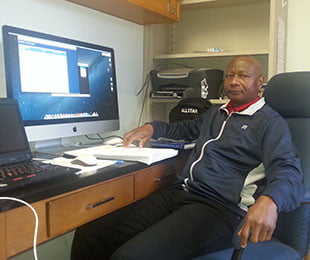By Dr. Moses Dogbevia, associate professor of chemistry
Dr. Dogbevia was on sabbatical during the spring 2016 semester. Here’s an update on what he did during sabbatical.
I was born and raised in Ghana and attended school there from elementary school through college, where I earned my undergraduate degree in physics with a diploma in science education. My teaching career began in Ghana, where I taught high school physics for nine years before leaving to continue my studies in the United States at the University of Nevada, Reno.
 My experiences in Ghana shaped me to understand what cultural diversity means to a society composed of people from different ethnic and cultural backgrounds. I taught in three different high schools in Ghana and learned how to impact students from different ethnic backgrounds, both in the classroom and in social settings. These experiences in Ghana were very useful in shaping my teaching style at Hastings College, where I became a faculty member in the Department of Chemistry in the fall of 2006.
My experiences in Ghana shaped me to understand what cultural diversity means to a society composed of people from different ethnic and cultural backgrounds. I taught in three different high schools in Ghana and learned how to impact students from different ethnic backgrounds, both in the classroom and in social settings. These experiences in Ghana were very useful in shaping my teaching style at Hastings College, where I became a faculty member in the Department of Chemistry in the fall of 2006.
As part of sabbatical, I have worked with Dr. Johnson Agbo, a theoretical chemist at Coastal Carolina University at Conway, South Carolina, to learn about simulation methods in chemistry. Dr. Agbo does research in computational chemistry and has set up a cluster for his research work in computer simulations at Coastal Carolina University.
When I was due to proceed on sabbatical leave, I felt this was the best opportunity for me to learn this new scientific technique for my professional development. Computer simulation is the discipline of designing a model of an actual or theoretical physical system, executing the model on a digital computer, and analyzing the execution output. Simulation embodies the principle of ”learning by doing.”
Computational and theoretical chemistry caught the attention of the scientific world in the last two decades. It is less expensive, reduces clutter and eliminates all the laboratory hazards associated with experimental science, so it garnered interest among the scientific community. This interest comes from both experimental and theoretical chemists because of the broad array of theoretical tools that are now available.
Theoretical tools developed to address properties of molecules in chemistry have, over the past several decades, served many other areas of science, including physics, biology, mathematics and computer science. Theoretical chemists have developed computer programs to predict atomic and molecular properties and paths of chemical reactions. This makes it a popular tool, employed in the pharmaceutical industry, especially in drug design.
Besides studying computer simulations under Dr. Agbo, we are putting together a laboratory journal for experiments in physical chemistry. This journal will be used to help students in the Hastings College physical chemistry classes have a better understanding of experiments they perform. It is mine and Dr. Agbo’s hope to develop the journal into a publishable textbook for physical chemistry laboratory work in the near future.
As a result of sabbatical, I hope to introduce basic simulation methods into my advanced level chemistry classes, such as Analytical (CHM 371) and Physical (CHM 386) Chemistry and this will create an opportunity for students to conduct basic experiments, as well as senior project work in simulation methods of chemistry.

